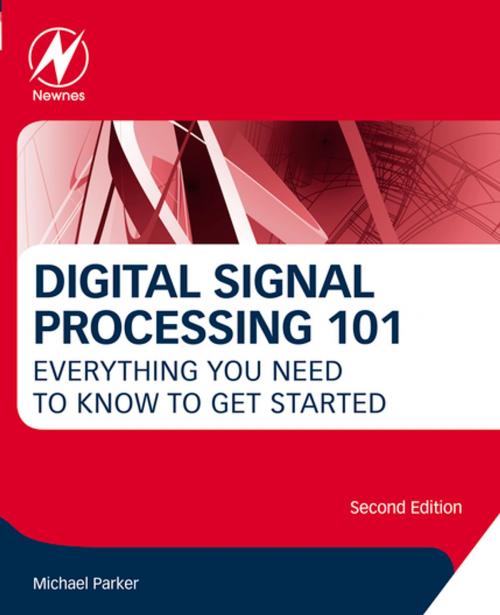Digital Signal Processing 101
Everything You Need to Know to Get Started
Nonfiction, Science & Nature, Technology, Engineering, Computers, General Computing| Author: | Michael Parker | ISBN: | 9780128114544 |
| Publisher: | Elsevier Science | Publication: | June 28, 2017 |
| Imprint: | Newnes | Language: | English |
| Author: | Michael Parker |
| ISBN: | 9780128114544 |
| Publisher: | Elsevier Science |
| Publication: | June 28, 2017 |
| Imprint: | Newnes |
| Language: | English |
Digital Signal Processing 101: Everything You Need to Know to Get Started provides a basic tutorial on digital signal processing (DSP). Beginning with discussions of numerical representation and complex numbers and exponentials, it goes on to explain difficult concepts such as sampling, aliasing, imaginary numbers, and frequency response. It does so using easy-to-understand examples with minimum mathematics. In addition, there is an overview of the DSP functions and implementation used in several DSP-intensive fields or applications, from error correction to CDMA mobile communication to airborne radar systems.
This book has been updated to include the latest developments in Digital Signal Processing, and has eight new chapters on:
-
Automotive Radar Signal Processing
-
Space-Time Adaptive Processing Radar
-
Field Orientated Motor Control
-
Matrix Inversion algorithms
-
GPUs for computing
-
Machine Learning
-
Entropy and Predictive Coding
-
Video compression
-
Features eight new chapters on Automotive Radar Signal Processing, Space-Time Adaptive Processing Radar, Field Orientated Motor Control, Matrix Inversion algorithms, GPUs for computing, Machine Learning, Entropy and Predictive Coding, and Video compression
-
Provides clear examples and a non-mathematical approach to get you up to speed quickly
-
Includes an overview of the DSP functions and implementation used in typical DSP-intensive applications, including error correction, CDMA mobile communication, and radar systems
Digital Signal Processing 101: Everything You Need to Know to Get Started provides a basic tutorial on digital signal processing (DSP). Beginning with discussions of numerical representation and complex numbers and exponentials, it goes on to explain difficult concepts such as sampling, aliasing, imaginary numbers, and frequency response. It does so using easy-to-understand examples with minimum mathematics. In addition, there is an overview of the DSP functions and implementation used in several DSP-intensive fields or applications, from error correction to CDMA mobile communication to airborne radar systems.
This book has been updated to include the latest developments in Digital Signal Processing, and has eight new chapters on:
-
Automotive Radar Signal Processing
-
Space-Time Adaptive Processing Radar
-
Field Orientated Motor Control
-
Matrix Inversion algorithms
-
GPUs for computing
-
Machine Learning
-
Entropy and Predictive Coding
-
Video compression
-
Features eight new chapters on Automotive Radar Signal Processing, Space-Time Adaptive Processing Radar, Field Orientated Motor Control, Matrix Inversion algorithms, GPUs for computing, Machine Learning, Entropy and Predictive Coding, and Video compression
-
Provides clear examples and a non-mathematical approach to get you up to speed quickly
-
Includes an overview of the DSP functions and implementation used in typical DSP-intensive applications, including error correction, CDMA mobile communication, and radar systems















